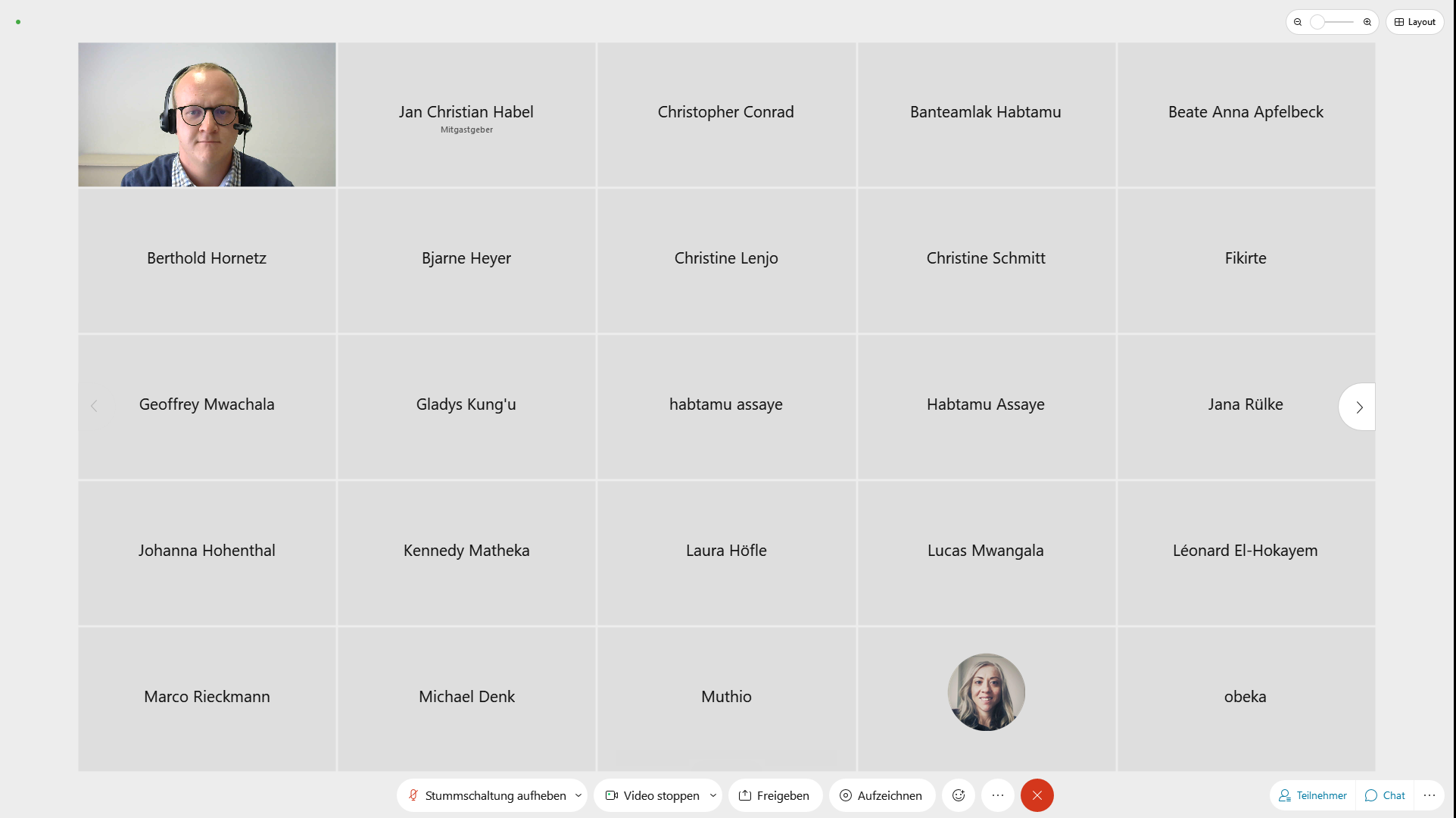Kick-off Meeting 11th May 2021
A virtual kick-off was held on 11th May 2021 online, with representatives of all partnering universities from Europe, Kenya and Ethiopia, and representatives of various institutions and stakeholders involved in this activity. Representatives of our Kenyan and Ethiopian partner institutions, Dr. Marianne Maghenda (TTU), Prof. Halimu Shauri (PU) and Dr. Solomon Addisu (BDU) kindly attended this opening meeting.

This kick-off day was initiated to officially launch the transdisciplinary project BIOCULT and to inform related institutions, scientists and interested students about this new activity, which will take place across Kenya and Ethiopia during the next three years (2021-2023). The meeting were opened by the regional director of the German Academic Exchange Service DAAD Nairobi, Ms Schindler-Kovats, Six keynote talks were held during the kick-off meeting, covering topics related to this project, and covering all three study areas. Some of the speakers are members of institutions, which will play a key-role in future activities of BIOCULT, such as the National Museums of Kenya, Nature Kenya, and other universities working on similar topics or in identical study regions.
Keynote talks were presented for all three regions of the project. The three regions embody different types of forest types and status, with a cultural or religious background, all of them being under extreme environmental stress: forest shrines called “fighis” in south-eastern Kenya in the Taita Hills massif, “kayas” along the coast of Kenya, and the church forests in northern Ethiopia. Three universities create the supra-national network within Kenya and Ethiopia, including the Pwani University (PU), Taita Taveta University (TTU) and Bahir Dar University (BDU). This international network will be completed by the Martin Luther University Halle-Wittenberg, University of Passau and University of Vechta, Germany. The National Museums of Kenya (NMK), the Paris Lodron University of Salzburg (PLUS) and Senckenberg German Entomological Institute (SDEI) represent additional valuable partners, in particular for expertise and local experiences in data collection and analyses, as well as for successful institutional networking and for effectual field work. The project consists of three-phases and seven working packages:
Agroecology and Land cover and Land use change (assessing recent agricultural practices, mapping of crops and yields and quantifying land use change using remote sensing and GIS mapping)
Vegetation ecology (horizontal and vertical vegetation structures, tree diversity and carbon stocks)
Insect ecology (vertical insect assessment and insect biomass across forest fragments)
Butterfly ecology (movement behaviour, population fluctuations and demography)
Bird viability and bird movement (bird diversity, population health and habitat range and usage of selected species)
Ecosystem Functions (measuring positive spill-over from forest fragments into surrounding agricultural land using REFA – Rapid Ecosystem Function Assessment)
Social sciences (surveys and expert interviews with farmers and stakeholders to identify human livelihood needs and address indigenous knowledge and cultural beliefs)
The three study regions were introduced by two keynote talks of acknowledged experts each. The “Fighis” of Taita Hills and the importance for cultural and bio-diversity were characterized through their floral uniqueness by Dr. Geoffrey Mwachala (NMK) and Dr. Johanna Hohenthal (University of Helsinki) gave a keynote talk on the challenges and possibilities of enhancing community participation and the role of local ecological knowledge in environmental management within the Taita Hills.
The design and importance of appropriate conservation measures on church forests in Ethiopia were visualized by Dr. Fikirte Demissie (Adama Science and Technology University) with her talk on the socio-economic importance of forest resources and their conservation measures in Ethiopia. More details on the recent status and threats of church forests in Ethiopia were presented by Ferehiwot Ademassie (Ghent University) with her talk “Understanding the interrelation between landscape structure on church forests’ resilience, bird ecology and agricultural production in Ethiopia”.
Francis Kagema (Nature Kenya) highlighted the reasons for the conservation of “Kaya” forests and their recent status and threats in Coastal Kenya. The keynote talk of Dr. Joyce Jefwa (NMK) on Human-environmental relations around kayas of coastal Kenya can be watch here:
A large audience attended the meeting and contributed to fruitful and stimulating discussions. People from the following institutions attended our kick-off meeting:
- Germany (44%): MLU Halle, Passau University, Trier, University, Osnabrück University, Vechta University
- Kenya (29%): DAAD, Nature Kenya, NMK, PU, TTU
- Ethiopia (15%): Bahir Dar University, Gondar University
- Austria (8%): PLUS
- Ghent University, Helsinki University
The complete programme of the kick-off day is provided here.
